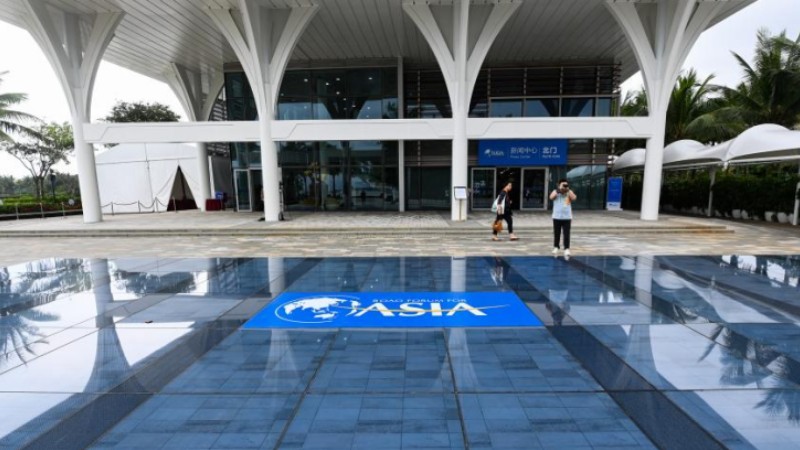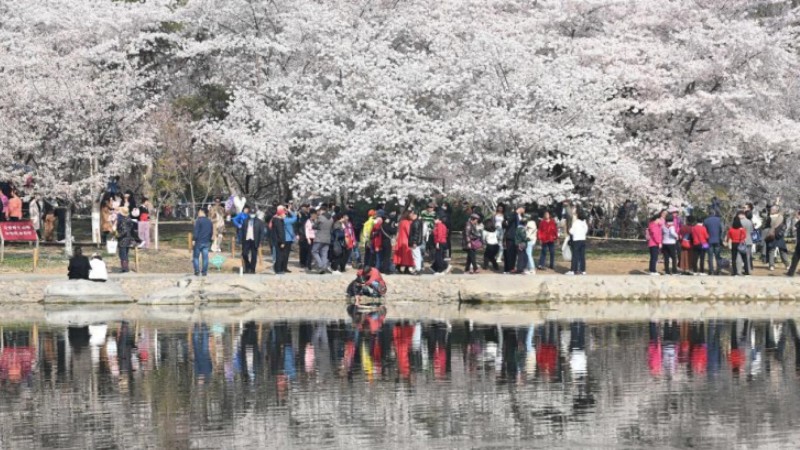U.S. an "empire of arbitrary detention" with worst human rights violations
Freedom from arbitrary detention is a fundamental individual right stipulated in the Universal Declaration of Human Rights (UDHR) of the United Nations, and an important provision in international human rights treaties.
However, the United States has carried out arbitrary detention in total disregard of its domestic legal provisions and international treaty obligations, causing serious physical and mental harm to the people involved.
The shocking facts and truth that the country has carried out arbitrary detention have laid bare its hypocrisy and double standards with regard to human rights.
The U.S. detention of immigrants at its domestic facilities is a serious violation of the "no use of torture" rule.
The U.S. Department of Homeland Security implements a policy of family separation at the U.S. border, which has caused severe suffering and torture to parents and children forcibly separated.
Women in custody at the Irvine County Detention Center in Georgia often suffered medical abuse and neglect.
The U.S. Immigration and Customs Enforcement regularly places migrants in local jails and prisons, where they suffer various kinds of physical abuse.
There is no specific regulations in the U.S. on how long immigrants should be detained, so the length of detention is decided by the place of detention and economic factors, and some even become indefinite.
In February 2022 alone, more than 9,400 unaccompanied child immigrants were detained by U.S. border law enforcement and some 4,000 of them were held in border custody for more than 72 hours.
According to an article in Politico Magazine, from February 2017 to June 2021, more than 650,000 people detained by the Border Patrol were under 18. More than 220,000 of those children, about one-third, were held for longer than 72 hours.
The UN human rights authority has expressed strong condemnation of the arbitrary detention of immigrants in the U.S.
U.S. practices of arbitrary detention and torture scandals around the world are even more horrible.
The country had been using "prison boats" to hold terrorist suspects since the Clinton administration. As many as 17 warships may have been used as "floating prisons" by the U.S. from 2001 to 2008.
A "Cost of War" report published by the Watson Institute for International and Public Affairs at Brown University reveals that after the 9/11 attacks, at least 54 countries and regions have participated in the U.S. black sites network, which has detained hundreds of thousands of people.
Under the excuse of the so-called "War on Terror," the U.S. has set up black sites in many other countries, covertly detained alleged terrorist suspects, and extracted confessions with torture and other ill-treatment–all of which are typical examples of its wanton destruction of the rule of law and violation of human rights.
Torture scandals have been constantly exposed in the notorious Guantanamo Bay detention camp, the Bagram prison in Afghanistan, and the Abu Ghraib prison in Iraq. Beatings, waterboarding, prolonged sleep deprivation and other enhanced interrogation techniques are outrageous.
"We are still very far from a full acknowledgment of what took place–let alone accountability for it," The Guardian pointed out in an article, adding that no one was held accountable for systematic practices of torture and rendition in the U.S. black sites, and an honest reckoning is long overdue.
Facing the frequent exposure of serious human rights violations at U.S. "black sites" overseas, the U.S. government has continued to cover up and deny its crimes.
In December 2002, then U.S. Secretary of Defense Donald Rumsfeld approved the use of a range of interrogation techniques at Guantanamo, including sensory deprivation, isolation and the use of vicious dogs. Washington blocked the information and impeded the revealing of findings by the International Committee of the Red Cross, and refused the recommendation made by the UN to shut down the prison.
According to the "Cost of War" report, four months after the death of Gul Rahman, who was held at Bagram prison and died of coldness and torture, the officer in charge of the interrogation was awarded a CIA commendation and $2,500 in cash awards.
In 2004, hundreds of prisoner abuse photos at Abu Ghraib prison were disclosed, but the U.S. military personnel, senior government officials and private military contractors involved have been spared trial. Only some low-level U.S. soldiers went through military trials and got convicted.
The U.S. government even has imposed economic sanctions and entry restrictions on the International Criminal Court chief prosecutor and other officials.
The U.S. has a long history of arbitrary detention and disregard of human rights both at home and abroad, reflecting a deep-seated political culture of racism and violence.
The rise of white supremacy in the country has exacerbated racial conflicts and led to frequent refugee crises in border areas. Race-based arbitrary detention tramples on the basic human rights of ethnic minorities and foreign immigrants. It further tears apart American society, creating social wounds that are difficult to heal.
The fact that the U.S. has arbitrarily detained illegal immigrants at home and set up a large number of "black sites" abroad to create cases of arbitrary detention reflects its deep-seated hegemonic and unilateralist thinking and violent political culture.
The arbitrary detentions of the U.S. at home and abroad tell the world that the country is in every sense an "empire of arbitrary detention" with the worst human rights violations.
The U.S. should face up to and reflect upon its own deplorable record with regard to democracy and human rights, stop politicizing democracy and human rights issues, stop interfering in other countries’ internal affairs in the name of democracy, and stop undermining the human rights of people of other countries.
(Zhong Sheng is a pen name often used by People's Daily to express its views on foreign policy and international affairs.)
Photos
Related Stories
- At least 21 killed, over 130 injured after tornadoes, storms hit multiple U.S. states
- Unsheltered Americans, shattered American dream
- Interview: U.S. system plutocratic rather than democratic, British commentator says
- U.S. pulls back from values once defining it: poll
- Federal gov't sues U.S. railroad over discharge of pollutants, hazardous substances
Copyright © 2023 People's Daily Online. All Rights Reserved.









